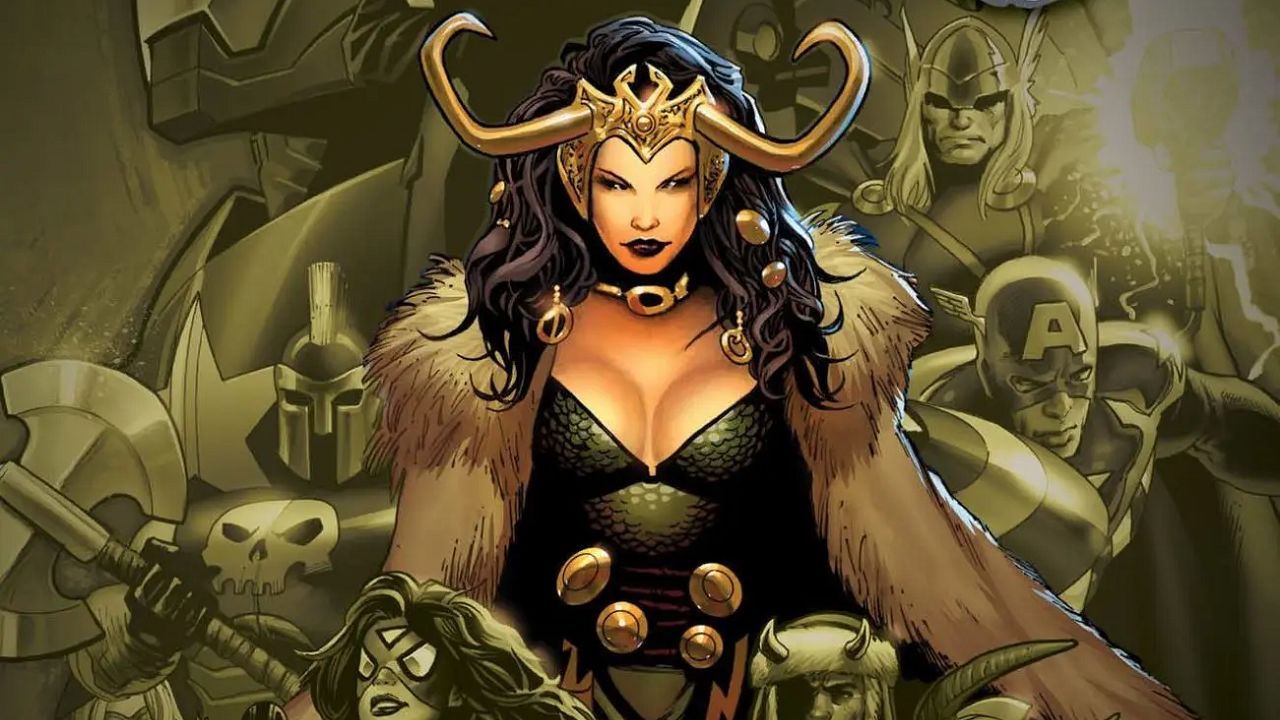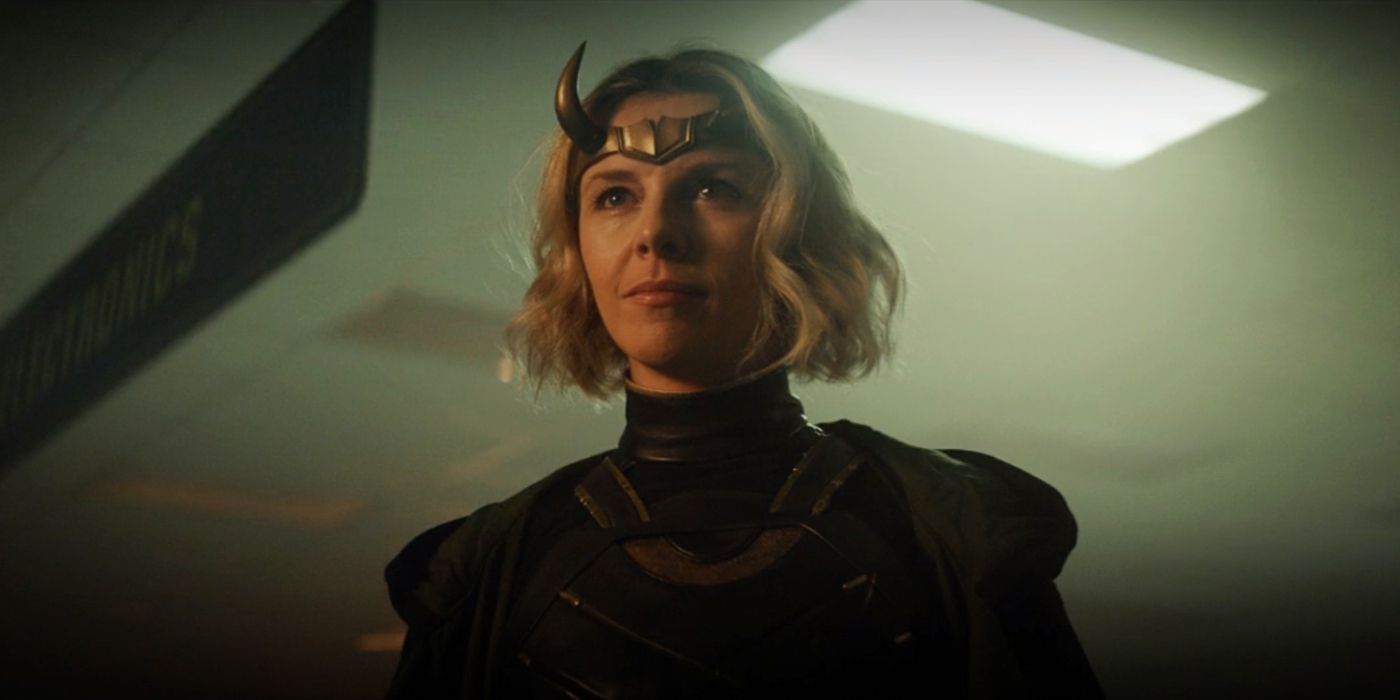The following article contains spoilers for Loki.
For at least a couple of minutes when the first previews for Loki started coming out, Marvel fans briefly thought that the mischief god might actually pay an odd visit to Scarlett Johansson's Black Widow, left stranded to fill Red Skull's shoes in Vormir as one of the possible scenarios for her afterlife. However, upon a couple of Google searches and some light reading it was easy to find out that the woman pictured next to Loki was not Natasha Romanoff, but instead actress Sophia Di Martino.
In early casting notes, Di Martino was credited as the Variant, the rogue version of Loki that Mobius M. Mobius and the TVA are hunting down to prevent any more timeline shenanigans and the whole reason why they recruited the Asgardian prince in the first place. If Loki was recruited due to his Loki expertise in the first place, then that would confirm early fan theories that the blonde Di Martino would be playing the comic book character known as Lady Loki.
With Marvel Studios looking to capitalize on Loki's popularity among Marvel fans, it made perfect sense for the show to be introduced as an alternate timeline take on almost completely detached from the events going on in the MCU during most of the Infinity Saga. Unlike WandaVision and The Falcon and the Winter Soldier, Loki is doing his own thing not directly tying up any loose ends after Avengers: Endgame, and the best way to really make Loki shine is to make the series all about him, even if that means that the main antagonist also happens to be a genderswapped Loki.
Since Loki was confirmed to be genderfluid in the show it's necessary to clarify that Marvel Studios seem to be taking its fair share of creative liberties when adapting Lady Loki's story for television. Lady Loki was originally one of the trickster god's many oddball plays from who set up his own reincarnation after perishing during the comics’ version of the Ragnarok apocalypse by taking a body that was meant for Lady Sif; in fact, the longer-lasting version of Lady Loki from the comics is the Earth-16191 variant more closely tied to America Chavez's Ms. America and She-Hulk in the A-Force more than she ever was to the mainline Loki from the comics.
Despite all this, hardcore Marvel Comics fans already know that the MCU isn't strange to taking a lot of creative liberties when it comes to adapting Loki for all audiences, after all, the mischievous anti-hero known and loves by moviegoers is a drastic departure from the genuinely evil and cruel personality he exhibits in print format. Suffice to say, with Loki the character and series being so different, Lady Loki's origins are not as important as for other characters considering the MCU is unlikely to borrow the exact same traits.
If something is to be taken from the big reveal in Loki's second episode, is that at least this female Loki variant shares the protagonist's cunning intellect for devising schemes that can catch even the real Loki with his guard down, aside from similar magic abilities that might even be enhanced. As Loki jumps in through a portal to hunt down the female Variant that has already bested him once, the audience at least knows that the two might sit down for a serious conversation at some point, possibly in Vormir since it's one of the many affected places and timelines affected by the multiple branches that were just created.
Is this even Lady Loki?
Some very patient Spanish-speaking fans who stuck around for the episode's final credits noticed that Di Martino's appearance in the episode saw her credited not as a "variant" nor Lady Loki, but instead simply as Sylvie, meaning that all theories trying to pinpoint the Lady Loki moniker on this mysterious blonde woman could be wrong. Although the MCU is usually pretty good at keeping secrets, there's no reason to deviate from the "Variant" name in such an obvious way, especially when the name Sylvie also has its own meaning in comic book lore.
To echo the words of Journey's "Don't Stop Believing", Sylvie Lushton was at some point just a small-town girl from Oklahoma who suddenly found herself infused with the kind of magic powers usually reserved for Marvel's finest. It's then explained that Sylvie is a creation made by Loki for his own amusement of having an earthling possess magical powers, with the Oklahoma-based enchantress having her own run-ins with the Young Avengers.
A key point to highlight here is that a couple of Sylvie's first appearances in Loki just so happened to be in small towns like Salina, Oklahoma or Oshkosh, Wisconsin, maybe further hinting at the comic book origin story to explain why she appears on the show. That said, even if this is indeed Sylvie Lushton and not Lady Loki, Marvel Studios' incarnation does seem to take elements from both as Sylvie was introduced in full Loki attire, with one broken horn making her stand out from her male counterpart.
Whatever role Marvel Studios has chosen for its genderfluid Loki, it seems that she might not ultimately be the Norse god's true enemy here, as Sylvie already told Loki "this is not about him". Loki instead seems pretty inclined to not let fans ignore the TVA's policing methods by having Mobius and Loki discuss the philosophical nature of each character's role in the universe and how the sacred timeline pretty much demands blind faith from the entire bureaucratic structure beneath it.



